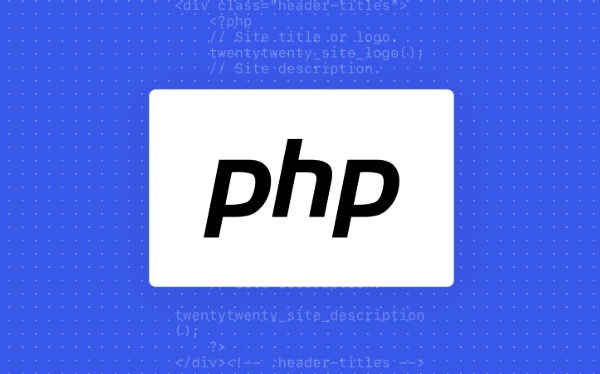Unit testing in PHP refers to writing small, independent tests for separate functions to verify that their behavior is as expected. For example, when testing an addition function using the PHPUnit framework, you can write the following test case: public function testAddReturnsSumOfTwoNumbers(){ $this->assertEquals(5, add(2, 3)); }, which verifies whether the output of add(2, 3) is 5. The importance of unit testing includes: 1. Early detection of errors; 2. Supporting secure reconstruction; 3. Documented function behavior. The steps to start using PHP unit testing are: 1. Install PHPUnit through Composer; 2. Create tests/directory; 3. Write corresponding test classes for each function or class; 4. Run tests frequently. Common errors include: 1. Relying on external systems; 2. Overwhelming content in a single test; 3. Ignoring passed tests. Mastering these basic points can help improve code quality and development efficiency.

Unit testing for PHP functions means writing small, isolated tests for individual functions in your code to make sure they work the way they're supposed to. It's not about testing the whole app or how things work together — just one function at a time, with specific inputs and expected outputs.

What Does a Unit Test for PHP Look Like?
A unit test in PHP usually checks a single function or method. For example, if you have a function that adds two numbers, your test would call that function with known values and check if the result is correct.
Let's say you have this simple function:

function add(int $a, int $b): int {
return $a $b;
}A basic unit test might look like this using PHPUnit (the most common testing framework for PHP):
public function testAddReturnsSumOfTwoNumbers()
{
$this->assertEquals(5, add(2, 3));
} This test says: when we call add(2, 3) , we expect the result to be 5 . If it's not, something's wrong.

Why Unit Testing Matters for PHP Functions
- Catches bugs early : If a function stops working after a code change, the test will fail right away.
- Helps with refactoring : You can safely change how a function works internally as long as the test still passes.
- Documents behavior : A good test shows what a function is supposed to do, which is helpful for other developers.
Without tests, you'd have to manually check every function after each change — which is slow and error-prone.
How to Get Started with Unit Testing in PHP
If you're new to unit testing, here's a quick path to get started:
- Install PHPUnit via Composer (
composer require --dev phpunit/phpunit) - Create a
tests/folder next to your code - Write one test class per function or class
- Run your tests often (like before you commit code)
A few tips:
- Test edge cases (like negative numbers, zero, or invalid input)
- Keep tests fast and independent
- Don't test everything at once — start small and grow your test coverage over time
Common Mistakes to Avoid
- Writing tests that depend on external systems (like databases or APIs)
- Testing too much in one test — keep each test focused on one thing
- Ignoring tests after they pass — make sure they stay up to date
That's basically what unit testing for PHP functions is all about. It's not complicated, but it makes a big difference once you get into the habit.
The above is the detailed content of What is unit testing for PHP functions?. For more information, please follow other related articles on the PHP Chinese website!

Hot AI Tools

Undress AI Tool
Undress images for free

Undresser.AI Undress
AI-powered app for creating realistic nude photos

AI Clothes Remover
Online AI tool for removing clothes from photos.

Clothoff.io
AI clothes remover

Video Face Swap
Swap faces in any video effortlessly with our completely free AI face swap tool!

Hot Article

Hot Tools

Notepad++7.3.1
Easy-to-use and free code editor

SublimeText3 Chinese version
Chinese version, very easy to use

Zend Studio 13.0.1
Powerful PHP integrated development environment

Dreamweaver CS6
Visual web development tools

SublimeText3 Mac version
God-level code editing software (SublimeText3)
 PHP Variable Scope Explained
Jul 17, 2025 am 04:16 AM
PHP Variable Scope Explained
Jul 17, 2025 am 04:16 AM
Common problems and solutions for PHP variable scope include: 1. The global variable cannot be accessed within the function, and it needs to be passed in using the global keyword or parameter; 2. The static variable is declared with static, and it is only initialized once and the value is maintained between multiple calls; 3. Hyperglobal variables such as $_GET and $_POST can be used directly in any scope, but you need to pay attention to safe filtering; 4. Anonymous functions need to introduce parent scope variables through the use keyword, and when modifying external variables, you need to pass a reference. Mastering these rules can help avoid errors and improve code stability.
 How to handle File Uploads securely in PHP?
Jul 08, 2025 am 02:37 AM
How to handle File Uploads securely in PHP?
Jul 08, 2025 am 02:37 AM
To safely handle PHP file uploads, you need to verify the source and type, control the file name and path, set server restrictions, and process media files twice. 1. Verify the upload source to prevent CSRF through token and detect the real MIME type through finfo_file using whitelist control; 2. Rename the file to a random string and determine the extension to store it in a non-Web directory according to the detection type; 3. PHP configuration limits the upload size and temporary directory Nginx/Apache prohibits access to the upload directory; 4. The GD library resaves the pictures to clear potential malicious data.
 Commenting Out Code in PHP
Jul 18, 2025 am 04:57 AM
Commenting Out Code in PHP
Jul 18, 2025 am 04:57 AM
There are three common methods for PHP comment code: 1. Use // or # to block one line of code, and it is recommended to use //; 2. Use /.../ to wrap code blocks with multiple lines, which cannot be nested but can be crossed; 3. Combination skills comments such as using /if(){}/ to control logic blocks, or to improve efficiency with editor shortcut keys, you should pay attention to closing symbols and avoid nesting when using them.
 How Do Generators Work in PHP?
Jul 11, 2025 am 03:12 AM
How Do Generators Work in PHP?
Jul 11, 2025 am 03:12 AM
AgeneratorinPHPisamemory-efficientwaytoiterateoverlargedatasetsbyyieldingvaluesoneatatimeinsteadofreturningthemallatonce.1.Generatorsusetheyieldkeywordtoproducevaluesondemand,reducingmemoryusage.2.Theyareusefulforhandlingbigloops,readinglargefiles,or
 Tips for Writing PHP Comments
Jul 18, 2025 am 04:51 AM
Tips for Writing PHP Comments
Jul 18, 2025 am 04:51 AM
The key to writing PHP comments is to clarify the purpose and specifications. Comments should explain "why" rather than "what was done", avoiding redundancy or too simplicity. 1. Use a unified format, such as docblock (/*/) for class and method descriptions to improve readability and tool compatibility; 2. Emphasize the reasons behind the logic, such as why JS jumps need to be output manually; 3. Add an overview description before complex code, describe the process in steps, and help understand the overall idea; 4. Use TODO and FIXME rationally to mark to-do items and problems to facilitate subsequent tracking and collaboration. Good annotations can reduce communication costs and improve code maintenance efficiency.
 Quick PHP Installation Tutorial
Jul 18, 2025 am 04:52 AM
Quick PHP Installation Tutorial
Jul 18, 2025 am 04:52 AM
ToinstallPHPquickly,useXAMPPonWindowsorHomebrewonmacOS.1.OnWindows,downloadandinstallXAMPP,selectcomponents,startApache,andplacefilesinhtdocs.2.Alternatively,manuallyinstallPHPfromphp.netandsetupaserverlikeApache.3.OnmacOS,installHomebrew,thenrun'bre
 How to access a character in a string by index in PHP
Jul 12, 2025 am 03:15 AM
How to access a character in a string by index in PHP
Jul 12, 2025 am 03:15 AM
In PHP, you can use square brackets or curly braces to obtain string specific index characters, but square brackets are recommended; the index starts from 0, and the access outside the range returns a null value and cannot be assigned a value; mb_substr is required to handle multi-byte characters. For example: $str="hello";echo$str[0]; output h; and Chinese characters such as mb_substr($str,1,1) need to obtain the correct result; in actual applications, the length of the string should be checked before looping, dynamic strings need to be verified for validity, and multilingual projects recommend using multi-byte security functions uniformly.
 Learning PHP: A Beginner's Guide
Jul 18, 2025 am 04:54 AM
Learning PHP: A Beginner's Guide
Jul 18, 2025 am 04:54 AM
TolearnPHPeffectively,startbysettingupalocalserverenvironmentusingtoolslikeXAMPPandacodeeditorlikeVSCode.1)InstallXAMPPforApache,MySQL,andPHP.2)Useacodeeditorforsyntaxsupport.3)TestyoursetupwithasimplePHPfile.Next,learnPHPbasicsincludingvariables,ech






